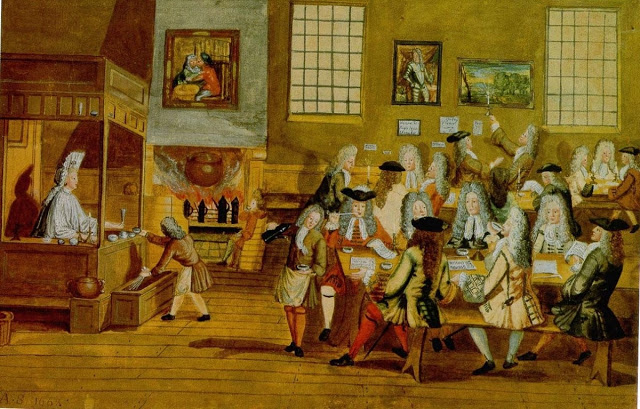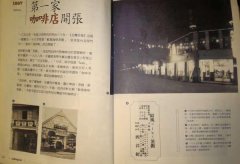The reason why British people like to drink tea comes from the alternation of tea culture and coffee culture.
It is known all over the world that English people are addicted to tea. But from the mid-17th century to the early 18th century, the whole of London was soaked in coffee instead of tea. British men switch from drinking to drinking coffee, or both. When they get drunk in a pub, they go to the cafe to sober up with caffeine, and then go to the pub to continue drinking.
But King Charles II of England banned cafes in 1675.
An order, a popular, from the lively and prosperous depravity, was the first country to drink coffee, but became the society of tea culture.
Why Yinghao tea, French coffee. ]
One strait, amorous feelings of two places, three kinds of comments, opposition everywhere.
[the King of England issues a ban on cafes]
Cafes in Europe are popular places for both men and women, but women are not allowed to enter cafes in England, so in 1674 British women issued a petition for women to boycott cafes. Women were strongly dissatisfied with men's indulgence in coffee shop talk all day long, so they severely criticized it.
In 1675, the Emperor quoted the petition for Women to boycott Cafe

Ordering the cafe to close is, of course, just an excuse. In fact, he always thought the cafe was a hotbed of rebellion and wanted to ban it as early as 1672, but put up with it again and again until the woman's petition became a good excuse.

Although the men put forward the "reply", they wrote that "coffee is an excellent drink." The virtue of liquid ", the" awakening effect "of caffeine can" stimulate the sympathetic nerve and stimulate vitality with a chain reaction ". In short, the crux of the petition and the answer lies not in the coffee itself, but in the women's backlash against men in total disregard of their families, and the excuses of their husbands' wayward selfishness.

As soon as the ban came out, coffee began to decline in Britain, and romantic women loved to go to gardens and teahouses to enjoy tea, so cafes gradually closed.
In addition, in 1662, Princess Catherine of Portugal married King Charles II of England, bringing the tea-drinking fashion to England. Princess Catherine regards tea as a bodybuilding drink, and is known as the "tea-drinking queen" because of her love of tea and worship of tea. As a result of her advocacy and promotion, coupled with the coffee ban of King Charles II, the style of drinking tea prevailed in the imperial court, and then extended to princes, nobles, noble families and ordinary people.
The first coffee shop in Oxford in 1650

It is said that Britain was one of the first countries to import coffee.
According to historical data, in 1637 John John Evelyn recorded in his diary that a Turkish refugee brought coffee to Oxford, while professors and students at Oxford University loved coffee because it helped boost spirits and help stay up late to study. In 1650, a Mr. Jacob opened the first cafe in Oxford; later, Oxford students founded (Oxford Coffee Club), which evolved into the famous Royal Society (Royal Society) in 1662.
The first coffee shop in London opened in 1652. The name of the cafe was Pasqua Rosee, which was located near the London Stock Exchange at that time and was also an important commercial center.
There was a distinction between social classes in stock trading at that time, and some classes could not enter the exchange to buy and sell stocks, but the cafe had no distinction of social status and became an important stronghold for over-the-counter trading and the exchange of stock information. and won the laudatory name of "the second Stock Exchange".
Important Notice :
前街咖啡 FrontStreet Coffee has moved to new addredd:
FrontStreet Coffee Address: 315,Donghua East Road,GuangZhou
Tel:020 38364473
- Prev

Introduction to the characteristics of Taiwan Purple Leaf Coffee Tree 'Men's Coffee' in Portugal
Purple Leaf Coffee (Purpurascens), non-self-pollinated coffee! Han Huaizong teacher Han Huaizong called this coffee "Men's Coffee" (Cafe Macho). The young leaves of the coffee are purple and the mature leaves are lilac. The flower is light red, the young fruit has purple stripes, the mature fruit is dark red, and the yield is low. Purple leaf coffee has masculinity, is a mutant sterile male flower, and can not be pollinated by itself.
- Next

The earliest coffee shop in Taiwan: an introduction to the coffee shop culture in the old society
Xiyangxuan, a cafe at the west gate of Taipei in 1897, and the Lion Cafe in the Park in Taipei in 1912 appeared at the Witt Cafe in Taiping Town, Taipei in 1931. The earliest cafe in Taiwan was called Xiyang Xuan in September 1897. There was an advertisement for the opening of Xiyang Xuan, a restaurant that called itself a teahouse. It sold Western food and wine, but it was advertised.
Related
- Beginners will see the "Coffee pull flower" guide!
- What is the difference between ice blog purified milk and ordinary milk coffee?
- Why is the Philippines the largest producer of crops in Liberia?
- For coffee extraction, should the fine powder be retained?
- How does extracted espresso fill pressed powder? How much strength does it take to press the powder?
- How to make jasmine cold extract coffee? Is the jasmine + latte good?
- Will this little toy really make the coffee taste better? How does Lily Drip affect coffee extraction?
- Will the action of slapping the filter cup also affect coffee extraction?
- What's the difference between powder-to-water ratio and powder-to-liquid ratio?
- What is the Ethiopian local species? What does it have to do with Heirloom native species?

